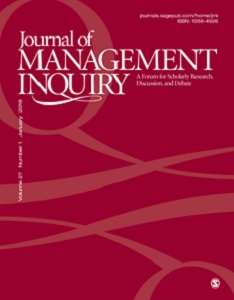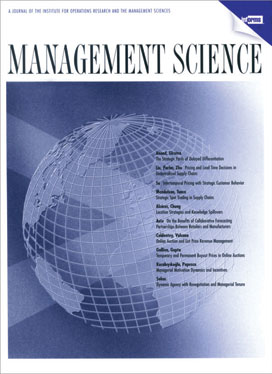Academic articles
Practitioner articles
Working papers
Books
Book chapters
Case studies
Other publications
Subject(s)
Economics, politics and business environment; Finance, accounting and corporate governance
Keyword(s)
Credit shocks, financial crisis, labor demand, employment, wages
JEL Code(s)
D92, G01, G21, J23, J31
We study the impact of exogenous funding shocks to German savings banks during the U.S. subprime mortgage crisis on the labor decisions of 30,000+ private and public firms in Germany. We find that firms with credit relationships with affected banks experience a significant decline in labor demand relative to firms with credit relationships with healthy banks, manifested in a simultaneous reduction in firm‐level employment and average wages. The employment effect is more pronounced in larger firms, while the wage effect is stronger in smaller firms. Both employment and wages go back to pre‐shock levels three years after the shock.
With permission of Elsevier
Volume
36
Journal Pages
16–27
Subject(s)
Strategy and general management
Keyword(s)
Status, competition, tournaments
Merton often envisioned status growth as a process of stepping across a boundary between one status grade and another more elite status grade. Such boundaries include the border between graduate school and a top academic department that young researchers try to traverse, or the frontier between scientists outside the French Academy and scientists inside the French Academy. As it is now common to measure status continuously using network data, the behavioral ramifications of status boundaries have been understudied in recent research. In this essay, we focus on competitive behaviors that emerge near a status boundary because of the desirability - as well as the “double injustice” - of the Matthew effect. Offering insights for future research, we discuss how these competitive behaviors are likely to delay, or even derail, status growth for those who are near a status boundary.
With permission of SAGE Publishing
Volume
27
Journal Pages
378–381
ISSN (Online)
15526542
ISSN (Print)
10564926
Subject(s)
Human resources management/organizational behavior
Keyword(s)
Anchor precision, negotiation entry, barriers-to-entry, first offers, social attribution, decision making
Precise first offers strongly anchor negotiation outcomes. This precision advantage has been previously documented only when the parties were already engaged in a negotiation. We introduce the concept of negotiation entry, i.e., the decision to enter a negotiation with a particular party. We predict that precise prices create barriers-to-entry, reducing a counterpart’s likelihood of entering a negotiation. Six studies (N=1,580) and one archival analysis of real estate sector data (N=11,214) support our barrier-to-entry prediction: Potential negotiators were less likely to enter a negotiation with precise versus round first offers. Using both statistical mediation and experimental-causal-chain analyses, we establish that perceptions of offer maker inflexibility underlie the precision barrier. Furthermore, we demonstrate that this inflexibility mechanism of precision is distinct from the mechanism (being offended) that creates barriers-to-entry for extreme first offers. The discussion theoretically integrates research on first-offer precision and extremity by offering the Precision-Extremity Model of First Offers.
With permission of Elsevier
Volume
148
Journal Pages
87–100
Subject(s)
Human resources management/organizational behavior
Keyword(s)
Self-confidence appearance, gender, job performance, prosocial orientation, organizational influence
Appearing self-confident is instrumental for progressing at work. However, little is known about what makes individuals appear self-confident at work. We draw on attribution and social perceptions literatures to theorize about both antecedents and consequences of appearing self-confident for men and women in male-dominated professions. We suggest that performance is one determinant of whether individuals are seen as confident at work, and that this effect is moderated by gender. We further propose that self-confidence appearance increases the extent to which individuals exert influence in their organizations. However, for women, appearing self-confident is not enough to gain influence. In contrast to men, women in addition are “required” to be prosocially oriented. Multisource, time-lag data from a technological company showed that performance had a positive effect on self-confidence appearance for both men and women. However, the effect of self-confidence appearance on organizational influence was moderated by gender and prosocial orientation, as predicted. Our results show that through self-confidence appearance, job performance directly enables men to exert influence in their organizations. In contrast, high performing women gain influence only when self-confidence appearance is coupled with prosocial orientation. We discuss the implications of our results for gender equality, leadership, and social perceptions.
© 2017 Wiley Periodicals, Inc.
Volume
57
Journal Pages
839–854
Subject(s)
Finance, accounting and corporate governance
Keyword(s)
Bank competition, microfinance, microcredit, microbank, loan rates, information dispersion, PAR, portfolio quality
JEL Code(s)
D4, G21, L1, O1
We study the effects of competition on loan rates and portfolio-at-risk in microcredit markets using a new database from rating agencies, covering 379 microbanks located in 67 countries between 2002 and 2008. Our study reveals different competitive effects in nonprofit and for-profit microbanks. We find that for-profit microbanks charge significantly lower rates and exhibit improved portfolio-at-risk in less concentrated markets. In particular, the effect of concentration on loan rates is nearly three times the one reported in previous studies in banking. In contrast, nonprofit microbanks are relatively insensitive to changes in concentration. We control for interest rate ceilings, which very significantly reduce rates in for-profit microbanks. However, our study also uncovers a competitive interplay between for-profit and nonprofit microbanks. In particular, the PAR of nonprofit microbanks deteriorates when the proportion of profit-oriented microbanks increases. Finally, we find evidence consistent with dispersion of borrower-specific information among competing microbanks in the for-profit sector, even after controlling for the presence of credit registries.
Volume
50
Journal Pages
893–937
Subject(s)
Human resources management/organizational behavior
Keyword(s)
Crowdsourcing science, reproducibility
The widespread replication of research findings in independent laboratories prior to publication is suggested as a complement to traditional replication approaches. The pre-publication independent replication approach further addresses three key concerns from replication skeptics by systematically taking context into account, reducing reputational costs for original authors and replicators, and increasing the theoretical value of failed replications.
© Cambridge University Press 2018
Volume
41
ISSN (Online)
1469-1825
ISSN (Print)
0140-525X
Subject(s)
Product and operations management
Keyword(s)
Supply chain management, uncertain consumer taste, product introduction, product positioning, store brands, national brands, information acquisition, information sharing, vertical differentiation, horizontal differentiation
In this paper, we study how a retailer can benefit from acquiring consumer taste information in the presence of competition between the retailers store brand (SB) and a manufacturers national brand (NB). In our model, there is ex-ante uncertainty about consumer preferences for distinct product features, and the retailer has an advantage in resolving this uncertainty because of his close proximity to consumers. Our focus is on the impact of the retailers information acquisition and disclosure strategy on the positioning of the brands. Our analysis reveals that acquiring taste information allows the retailer to make better SB positioning decisions. Information disclosure, however, enables the manufacturer to make better NB positioning decisions – which in return may benefit or hurt the retailer. For instance, if a particular product feature is quite popular, then it is beneficial for the retailer to incorporate that feature into the SB, and inform the manufacturer so that the NB also includes this feature. Information sharing, in these circumstances, benefits both the retailer and the manufacturer, even though it increases the intensity of competition between the brands. But, there are situations in which the retailer refrains from information sharing so that a potentially poor positioning decision by the NB makes the SB the only provider of the popular feature. The retailer always benefits from acquiring information. However, it is beneficial to the manufacturer only if the retailer does not introduce an SB due to the associated high fixed cost.
With permission of Elsevier
Volume
268
Journal Pages
555–568
Subject(s)
Information technology and systems; Technology, R&D management
Keyword(s)
Cybersecurity, information security, legislation, risk management
With the increasing importance of the security of information technology for all areas of life, the IT security law has developed step by step without the European and German legislation being able to follow an overall draft. At the latest with the IT security regulations in the General Data Protection Regulation and the expansion of sector-specific regulations on IT security, questions of the systematization of the new area of law arise. The authors examine three key questions - the modeling of systems subject to the law, the concept of risk management, and the determination of the state of the art security measures. Finally, they outline the main elements of a restructuring of IT security law.
[Das IT-Sicherheitsrecht will die IT-Sicherheit schützen, folgt aber weder auf europäischer noch auf deutscher Gesetzgebungsebene einem Gesamtentwurf. Der Beitrag geht drei Schlüsselfragen nach – der Modellierung der dem Recht unterworfenen Systeme (II.), dem Risikobegriff (III.) sowie der Ermittlung des Standes der Technik (IV.) – und entwirft Grundzüge einer Strukturierung des IT-Sicherheitsrechts (V.).]
Volume
34
Journal Pages
706–720
ISSN (Online)
2194-4172
Subject(s)
Human resources management/organizational behavior
Keyword(s)
Negotiation, alternatives, power, first offer, mental simulation
The present research demonstrates that negotiators can act powerfully without having power. Researchers and practitioners advise people to obtain strong alternatives prior to negotiating to enhance their power. However, alternatives are not always readily available, often forcing negotiators to negotiate without much, or any, power. Building on research suggesting that subjective feelings of power and objective outcomes are disconnected and that mental simulation can increase individuals' aspirations, we hypothesized that the mental imagery of a strong alternative could provide similar psychological benefits to having an actual alternative. Our studies demonstrate that imagining strong alternatives causes individuals to negotiate more ambitiously and provides them with a distributive advantage: negotiators reached more profitable agreements when they either had a strong tendency to think about better alternatives (Study 1) or when they were instructed to mentally simulate an attractive alternative (Studies 3-4). Mediation analyses suggest that mental simulation boosts performance because it increases negotiators' aspirations which translate into more ambitious first offers (Studies 2-4), but only when the simulated alternative is attractive (Study 2b). Our findings further show that mental simulations are only beneficial when there is sufficient room in the negotiation to reach a profitable agreement, but backfire in settings where negotiators' positions are difficult to reconcile (Study 5). An internal meta-analysis of the file-drawer produces effect size estimates free of publication bias and demonstrates the robustness of the effect. Our findings contribute to research on social power, negotiations, and mental simulation.
Copyright © 2018 American Psychological Association.
Reproduced with permission.
Volume
115
Journal Pages
96–117
ISSN (Online)
1939-1315
ISSN (Print)
0022-3514
Subject(s)
Product and operations management
Keyword(s)
Pricing, choice behavior, rational inattention, information acquisition, signaling game
We study the optimal pricing problem of a monopolistic firm facing customers with limited attention and capability to process information about the value (quality) of a single offered product. We model customer choice based on the theory of rational inattention in the economics literature, which enables us to capture not only the impact of true quality and price, but also the intricate effects of customer’s prior beliefs and cost of information acquisition and processing. We formulate the firm’s price optimization problem assuming that the firm can also use the price to signal the quality of the product to customers. To delineate the economic incentives of the firm, we first characterize the pricing and revenue implications of customer’s limited attention without signaling, and then use these results to explore Perfect Bayesian Equilbiria (PBE) of the strategic pricing signaling game. As an extension, we consider heterogeneous customers with different information costs as well as prior beliefs. We discuss the managerial implications of our key findings and prescribe insights regarding information provision and product positioning.
© 2017, INFORMS
Volume
64
Journal Pages
2995–3014
ISSN (Online)
1526-5501
ISSN (Print)
0025–1909


